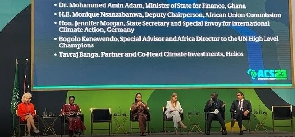 Dr Mohammend Amin Adam making a submission at the 2023 Africa Climate Summit held in Nairobi
Dr Mohammend Amin Adam making a submission at the 2023 Africa Climate Summit held in Nairobi
The Minister of State at the Ministry of Finance, Dr. Mohammed Amin Adam, has called for comprehensive global funding reforms at the 2023 Africa Climate Summit in Nairobi, in a bid to realise climate stability.
He emphasised the importance of international financial reforms and the need for advanced countries to collaborate with vulnerable nations to combat climate change.
At the 2023 Africa Climate Summit held in Nairobi, the Minister of State at the Ministry of Finance stressed the urgency of establishing a comprehensive global funding mechanism to address the challenges posed by climate change.
The summit, organised under the theme ‘Driving green growth and climate finance solutions for Africa and the world’, aimed to mobilise action ahead of the upcoming UN Climate Change Conference, COP28, in November.
Dr. Adam asserted that international financial reform is essential to accelerate progress in combatting climate change. He called for multilateral development banks, especially those operating on the African continent, to increase their resources dedicated to climate-related activities. This, he argued, will enable regional institutions to effectively implement climate strategies.
“Another way to address the challenge of creating fiscal space for climate action is for the global system to move away from austerity measures, while accounting for the impact of climate change in debt financing,” Dr. Adam advised.
He highlighted the vulnerability of regions to climate change which could lead to severe indebtedness, and called for refined tools such as debt sustainability analysis to be made available to affected countries.
Additionally, he proposed climate contingency swap-lines between central banks and other liquidity options.
Securing global agreements on carbon exchange is another critical element Minister Adam emphasised. He urged advanced countries to collaborate closely with vulnerable nations to reduce carbon emissions, rather than rejecting products from Africa due to perceived high carbon content.
Ghana has taken significant steps to combat climate risks and secure international funding commitments, launching initiatives like the Global Shield against Risks and Global Risk Modeling Alliance. These multi-stakeholder efforts aim to protect vulnerable economies and communities from climate-related disasters. These mechanisms, offering pre-arranged and trigger-based financing, are essential for ensuring timely and effective responses to climate-related challenges. The importance of such financial instruments lies in being able to be activated quickly in response to climate-related emergencies.
In addition to financial reforms, Dr. Adam highlighted the importance of political stability for policy consistency in addressing climate change. Recent political unrest in some African regions has hindered climate action efforts, making policy consistency a crucial element in the continent’s pursuit of investment financing.
He urged African nations to guard against acts that undermine regional stability and cooperation, while emphasising the need to tap into abundant opportunities for the greater good of their citizens. Political conflicts and instability, he noted, can have negative spill-over effects on neighbouring countries; thus affecting foreign investment flow in the region.
“Overall, conflict in Africa can have far-reaching and complex consequences for international investment and regional economic development. It is critical for governments, corporations and other stakeholders to collaborate in addressing the core causes of conflict and create stability, security and prosperity,” he emphasised.
The Africa Climate Summit aimed at addressing the continent’s increasing exposure to climate change and its associated costs. Minister Adam stressed the importance of scaling high-impact climate finance for Africa, and reducing the cost of capital through blended finance. He highlighted green bonds as a promising tool to mobilise substantial financial resources for climate projects, but emphasised the need for enhanced awareness and capacity building among African nations.
“Standardised frameworks and certification processes that instil confidence in investors are crucial. Harmonising these standards at a regional level could facilitate cross-border investment and boost investor confidence,” he noted.
During a separate panel discussion on the topic ‘From commitment to action: creating fiscal space for climate action, agenda 2063 and the SDGs in Africa’, the minister discussed various challenges facing the V20 – including accessing capital, underrepresentation of climate-vulnerable countries in global governance, and international trade mitigations.